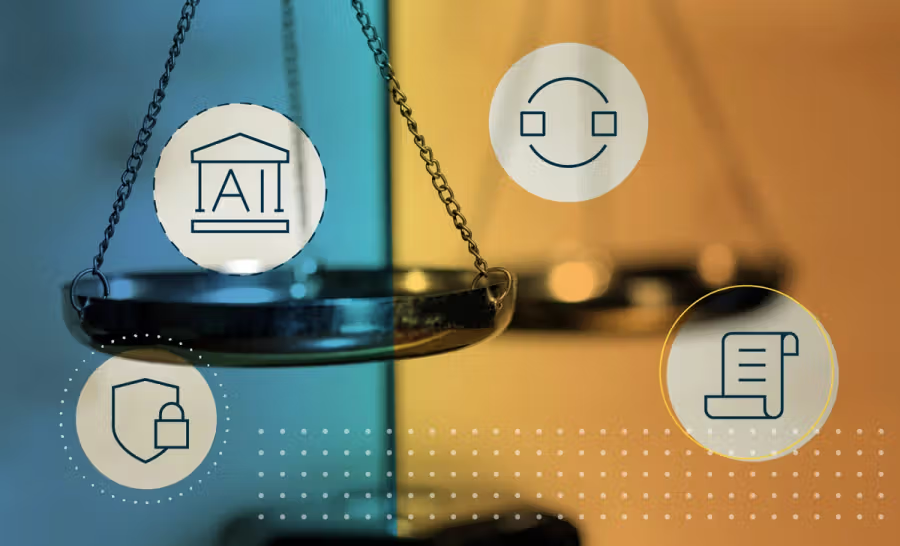AI governance: Key for addressing the Executive Order on safe, secure and trustworthy artificial intelligence

Artificial Intelligence (AI) is advancing at an unprecedented pace and becoming increasingly integrated into our daily lives. Discussions surrounding AI governance, regulation, and ethics have taken center stage. The United States government, along with many other countries, has recognized the need to establish a framework for responsible AI development and deployment. This blog will delve into two crucial developments in the realm of AI governance: the AI Bill of Rights and the AI Executive Order and explore why AI governance is of paramount importance.
The AI Bill of Rights
The AI Bill of Rights, a concept that has been gaining traction in recent years, is a proposed set of fundamental principles aimed at protecting individuals, businesses, governments and society from potential AI-related risks and harms, which include:
- Data privacy: The right to data privacy in AI systems means specifically AI should not infringe upon an individual’s right to privacy. Personal data should be handled with care. Transparency about personal data usage is essential for the protection of basic human rights.
- Algorithmic discrimination protection: The Right to Fairness with AI states that AI should not discriminate against individuals based on factors such as race, gender or socioeconomic status. Fairness and equity should be at the core of AI design, deployment and intended use.
- Notice and explanation: The Right to Transparency with AI is that AI systems should be transparent in their decision-making processes. Users and stakeholders should have access to information about how AI systems arrive at their conclusions.
- Human alternatives, consideration and fallback: The Right to Accountability or those responsible for the development and deployment of AI should be held accountable for any harm caused by these systems. This includes both organizations and individuals.
- Safe and effective systems: The Right to Safety with AI systems says that systems should be designed with safety in mind to prevent physical or psychological harm to users and society as a whole.
The AI Bill of Rights serves as a foundational document, acknowledging the importance of upholding human rights in an AI-driven world. It offers a framework for ensuring that AI technologies are developed and used responsibly, ethically and in ways that benefit humanity rather than harm it.
The AI Executive Order
On October 30, 2023, President Joe Biden signed an Executive Order on Safe, Secure and Trustworthy AI governance to promote competition in the American Economy, which includes significant provisions related to AI. This executive order directs federal agencies to take action to promote competition in the AI industry, addresses potential anti-competitive practices, and ensures the safety of Americans in an AI driven world. Some key components of the AI Executive Order include:
- New standards for AI safety and security: Establishing a set of rules and actions to protect Americans from risks related to the use of artificial intelligence, the largest set of rules of its kind in history.
- AI development: Developers of powerful AI are now required to ensure safety in the use of these systems as well as safety in the use of the tools to develop their AI models including the data that is fed into these AI systems so that this information is accurate and trustworthy. And removing the use of AI to create biological weapons.
- Security: Instituting a cybersecurity framework or program that will help develop AI safely, and work towards identifying and resolving issues within AI programs.
- Privacy: Creating new methods to protect Americans protected information and create new privacy preservation techniques. To evaluate how federal agencies obtain and use information with AI and develop federal guidelines on techniques to preserve Americans privacy.
- Encouraging innovation: The order recognizes the importance of AI innovation and calls for increased investment in AI research and development to maintain American leadership in the technology sector.
- Regulatory oversight: It mandates federal agencies to examine potential AI-related anti-competitive practices and take appropriate measures to ensure fair competition.
- Data access: The order promotes access to data necessary for AI development and competition, emphasizing the importance of sharing government-generated data.
- Ensure responsible and effective use of AI: The government can leverage AI to provide faster, better results for the people of America, by issuing guidance on how agencies can use AI, help to acquire the right AI Tools, and the hiring of key AI Governance professionals.
Why AI governance is crucial
The AI Bill of Rights and the AI Executive Order underscore the urgency of AI governance for several reasons:
- Ethical concerns: AI has the potential to amplify existing biases, infringe on privacy and cause harm if not regulated. Effective governance ensures that AI is developed and used ethically and responsibly.
- Economic competition: Without regulation, AI markets can become dominated by a few powerful players, stifling competition and innovation. The AI Executive Order seeks to address these issues and foster a more competitive landscape.
- National security: AI has significant implications for national security, making it crucial for governments to establish oversight mechanisms and protect sensitive technologies.
- Trust and transparency: A well-regulated AI environment builds trust among users and stakeholders. Transparency and accountability are critical for the successful integration of AI into society.
The AI Bill of Rights and the AI Executive Order represent essential steps towards responsible AI governance in the United States. We live in a world where AI is rapidly transforming various aspects of our lives, ensuring that these technologies are used for the benefit of humanity is paramount.
How Collibra AI Governance can help
Effective AI governance is necessary to balance innovation with ethics, safeguard individual rights, and foster healthy competition, ultimately creating a better future for all. In the age of data-driven decision making, Artificial Intelligence (AI) is becoming increasingly integral to businesses of all sizes and industries, as well as government agencies. AI can analyze vast datasets, automate processes and offer invaluable insights. However, this burgeoning dependence on AI also raises concerns about data privacy, ethics and compliance. This is where Collibra AI Governance steps in, playing a crucial role in ensuring responsible, ethical and effective AI implementations.
Data privacy and compliance
One of the primary concerns in AI is data privacy and regulatory compliance. With stricter data protection laws being developed or already in place, organizations must ensure that their AI systems adhere to these regulations. Collibra AI Governance provides a framework for tracking and managing the data used by AI models, ensuring that it is collected and processed legally and transparently.
AI Governance also facilitates compliance with industry-specific regulations, such as HIPAA for healthcare or FINRA for financial services. By centralizing and automating data governance tasks, organizations can reduce the risk of non-compliance and potential legal consequences.
While AI Governance may sound and feel new, robust Data Governance programs with established frameworks can organically evolve to support the following use case areas focused on AI.
Ethical AI
Ethical considerations are at the forefront of AI discussions. AI systems can inadvertently perpetuate bias, discrimination, and unfairness if not carefully monitored and controlled. Collibra AI Governance helps organizations establish and enforce ethical guidelines for AI development and usage.
With AI Governance, businesses can actively identify and mitigate biases in their AI models, ensuring fair and unbiased results. This not only fosters ethical responsibility but also safeguards the organization’s reputation.
Quality and transparency
To have confidence in AI-driven decisions, businesses need transparent and high-quality data. Collibra AI Governance promotes data quality with Collibra DQ, by ensuring that data sources are reliable, offering a clear view of how data is transformed and used throughout the AI pipeline, and establishing data lineage to validate the veracity of the source and structure of the information being used by the AI language models.
Moreover, AI Governance fosters transparency by providing documentation and audit trails, making it easier for organizations to understand and explain AI model decisions to stakeholders, regulators and customers. This not only builds trust but also simplifies the process of addressing issues or making improvements.
Risk management
AI Governance also plays a crucial role in risk management. By implementing effective governance practices, organizations can proactively identify and address potential risks associated with AI implementations. This includes assessing the impact of AI on existing processes, identifying vulnerabilities and ensuring that mitigation strategies are in place.
Through ongoing monitoring and auditing, Collibra AI Governance empowers organizations to manage AI-related risks, helping them avoid costly errors, security breaches and reputational damage.
Maximizing ROI
Collibra AI Governance isn’t just about mitigating risks and ensuring compliance; it also helps maximize the return on investment (ROI) for AI initiatives. By providing a structured approach to managing AI data assets and processes, organizations can optimize their AI models for better performance and efficiency.
AI Governance enables the organization to identify and eliminate redundant or irrelevant data, reducing data storage costs. It also streamlines data integration, reducing data silos and enhancing collaboration across teams.
AI is revolutionizing industries and reshaping the way organizations operate. Collibra AI Governance has emerged as a critical component for ensuring responsible and effective AI implementations, from the start of these initiatives and throughout their lifecycle. Helping to address data privacy concerns, fostering ethical AI development, ensuring data quality and transparency, risk management, and maximizing ROI are all supported by Collibra AI Governance.
As AI continues to evolve and expand its reach, the role of AI Governance in safeguarding data and promoting responsible AI practices cannot be overstated. Organizations that embrace Collibra AI Governance are better positioned to reap the benefits of AI while managing its inherent challenges and complexities.
***
Disclaimer: AI was not used to write this blog
In this post:
Related articles

AIMay 21, 2024
Collibra wins prestigious 2024 Communicator Award for AI Governance campaign

AIJuly 15, 2024
How to observe data quality for better, more reliable AI

AINovember 13, 2023
AI ethics and governance: responsibly managing innovation

AI GovernanceFebruary 28, 2025
AI agents: Build or buy, governance remains critical
Keep up with the latest from Collibra
I would like to get updates about the latest Collibra content, events and more.
Thanks for signing up
You'll begin receiving educational materials and invitations to network with our community soon.



